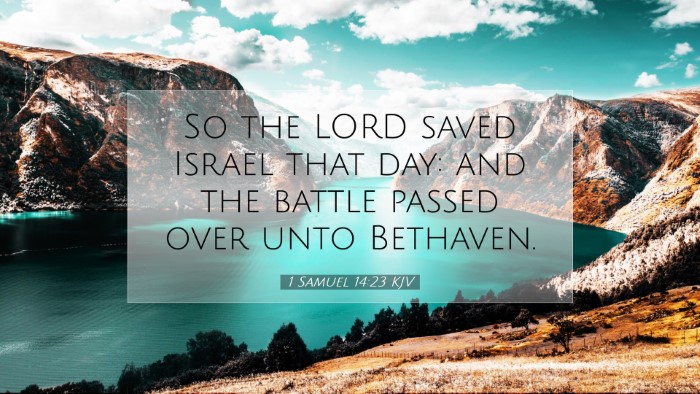Commentary on 1 Samuel 14:23
Verse Text: "So the Lord saved Israel that day: and the battle passed over unto Bethaven."
Introduction
This verse encapsulates a pivotal moment in Israel's history during the reign of King Saul. Here, we see the divine intervention of God in battle, emphasizing His sovereignty and the importance of faith in military endeavors. Commentators throughout history have sought to extract theological insights and practical applications from this profound verse.
Divine Deliverance
Matthew Henry's Commentary: Henry highlights that the Lord's intervention marks a turning point in Israel's fortunes, illustrating that the Lord is the true source of victory. The phrase "the Lord saved Israel" underscores the belief that human efforts alone are insufficient without divine assistance.
Albert Barnes: Barnes elaborates on the significance of God's saving action, noting that divine providence guided the events leading to Israel's victory. He draws attention to the fact that God often uses unexpected means to bring deliverance, in this instance, the spontaneous attack by the Philistines that caused confusion within their ranks.
Adam Clarke: Clarke reinforces the idea that God's deliverance is not only physical but spiritual. He reflects on the hope that such interventions provide to the faithful, serving as a reminder of God's continual presence and support in times of need.
The Role of Human Action
Matthew Henry: While emphasizing God's sovereignty, Henry also points out that human action plays a vital role. Saul's son, Jonathan, acted in faith and courage, which initiated the victory. This intertwining of divine and human effort is a common theme in the Scripture, suggesting that God often works through willing instruments.
Albert Barnes: Barnes notes that Jonathan’s initiative reflects a faith-driven action that God blesses. This highlights an important principle for leaders and believers alike: acting in faith often leads to God’s deliverance. The contextual contrast between Jonathan and Saul reflects differing leadership styles and levels of faith in God's providence.
Adam Clarke: Clarke comments on the necessity of courage and action in the life of the believer. He encourages the reader to recognize that faith must be accompanied by deeds. The battle called for action on the part of Jonathan, illustrating that while God saves, He also expects His people to participate in His work.
Significance of the Location
Contextual Analysis: The reference to Bethaven is significant as it was a place associated with idolatry and spiritual unfaithfulness. This adds depth to the narrative, suggesting that God's grace can shine even in areas of spiritual darkness. Both Henry and Clarke comment on how God's redemptive actions transcend human failure and sin.
Matthew Henry: Henry notes that the spiritual condition of the people does not negate God’s ability to save. This gives hope to contemporary readers who may feel entrenched in spiritual barrenness.
Albert Barnes: Barnes argues that God's deliverance is even more remarkable given the setting of the battle. The contrast between Bethaven and the miraculous victory underscores God's supremacy over false gods and His desire to reclaim His people for righteousness.
Adam Clarke: Clarke further adds that the divine act of salvation serves as a reminder of God’s mercy. He suggests that the location's turmoil mirrors the struggles within the hearts of the Israelites, yet God's intervention provides a pathway to restoration.
The Theological Implications
This verse serves as a profound reminder of several critical theological principles that are especially relevant to pastors, students, theologians, and scholars:
- The Sovereignty of God: The victory belongs to the Lord, illustrating that He orchestrates history according to His divine will.
- The Necessity of Faith: Jonathan’s actions exemplify that faith in God leads to obedience and decisive action in challenging circumstances.
- Human Responsibility: While God is sovereign, He calls His people to engage in His plans, demonstrating a partnership that is vital for effective ministry and mission.
- Hope in Human Failure: Amidst spiritual decline, God can still work miraculously, providing a hopeful outlook for those engaged in ministry or leadership.
Practical Applications
In light of the commentary from notable theologians, several practical lessons emerge from 1 Samuel 14:23:
- Encouragement for Leaders: Leaders are encouraged to follow the example set by Jonathan, demonstrating courage and faith, especially in uncertain times.
- Call to Action: Believers should reflect on their personal faith and consider how they might act in obedience to God's calling in their lives.
- Trusting Divine Providence: Understanding that while they face various battles, God remains sovereign, providing the needed strength and direction.
- Restoration through Grace: The assurance that even in places of spiritual darkness, God's grace is sufficient to bring deliverance and restoration.
Conclusion
1 Samuel 14:23 encapsulates a moment of profound theological significance and practical application. By intertwining the themes of divine sovereignty and human action, this verse offers rich insights that can inspire faith and action within the lives of believers. As we reflect on this account, may we always remember the importance of trusting in God’s providence while actively participating in the work of His kingdom.


